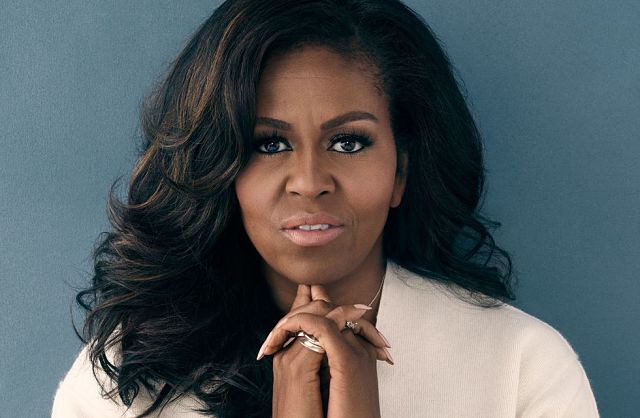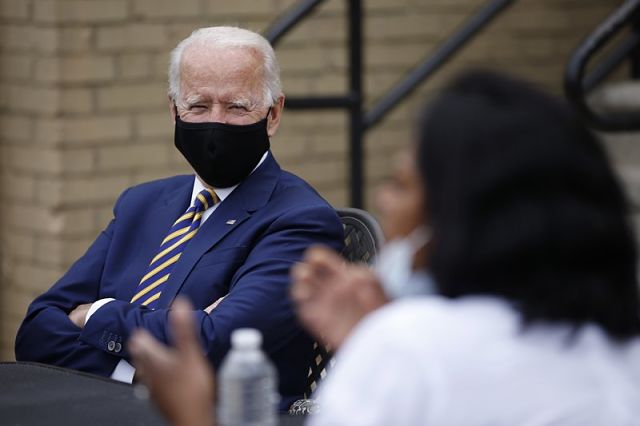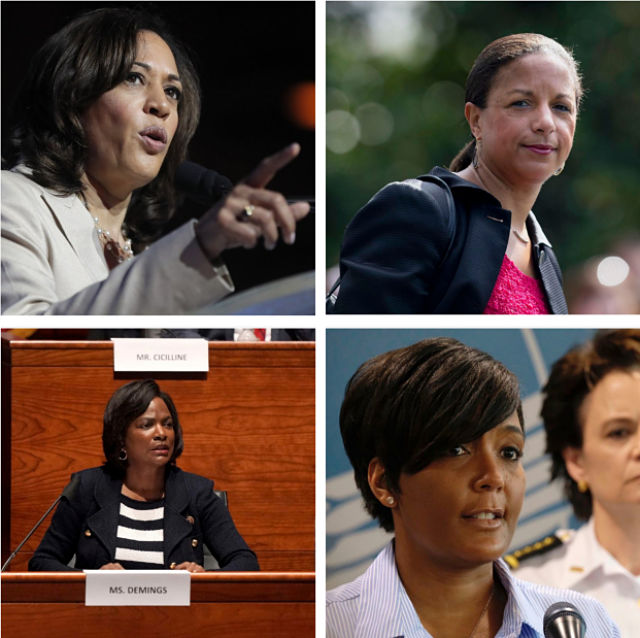 This year as Ethiopian Americans we will be voting in one of the most consequential elections. In the following timely article from Harper’s Bazaar former First Lady and When We All Vote Co-Chair Michelle Obama talks to Shonda Rhimes about why voting matters - maybe now more than ever. (Harper's BAZAAR)
This year as Ethiopian Americans we will be voting in one of the most consequential elections. In the following timely article from Harper’s Bazaar former First Lady and When We All Vote Co-Chair Michelle Obama talks to Shonda Rhimes about why voting matters - maybe now more than ever. (Harper's BAZAAR)
Harper’s BAZAAR
Michelle Obama Wants You to Remember the Impact of a Single Vote
SHONDA RHIMES: The theme of this issue of Harper’s BAZAAR is hope, and I think it’s accurate to say that 2020 has been an uncomfortable year. One that I’ve found to be scary at times, frustrating at times, painful at times, and yet hopeful at times—the peaceful marches worldwide after the wrongful death of George Floyd come to mind. It’s been an important year. When you look out at the world right now, what gives you hope for the future? And is there anything that this experience we’re all living through right now has revealed to you that makes you hopeful?
MICHELLE OBAMA: With everything that’s gone on over these past few months, I know a lot of folks out there have been confused, or scared, or angry, or just plain overwhelmed. And I’ve got to be honest, I count myself among them. I think we’ve all been there. Our foundation has been shaken—not just by a pandemic that stole more than 100,000 of our loved ones and sent tens of millions into unemployment, but also by the rumbling of the age-old fault lines of race, class, and power that our country was built on. The heartache and frustration that boiled over after the losses of George Floyd, Breonna Taylor, Ahmaud Arbery, and so many others has caused a lot of us to grapple with the very essence of who we are—the kind of people we want to be. But even in that, I find hope. I think a lot about the younger generation growing up right now, about how they’re seeing just how fragile even the best-laid plans can be. In this tumultuous period, they’ve been learning something that often took previous generations years, or decades, to understand: that life can be unfair. It can be unjust. And more than anything is always uncertain. But if you live by foundational truths—like honesty, compassion, decency—and if you channel your frustration into our democracy with your vote and your voice, you can find your true north even in times of crisis. Because of all this upheaval, this generation is learning those lessons faster than folks our age did. They’re learning it together and making their voices heard. And I couldn’t be more inspired by so much of what I’ve seen. So even while there’s a lot of pain out there, and that pain is very real, that’s something that gives me hope—the hope that this generation will not only learn these lessons earlier than ours ever did, but apply them in ways that we never could. But also let me be clear: Making progress on these issues isn’t just on the shoulders of young people. It isn’t just on people of color. It’s up to all of us, no matter what we look like or where we come from. We’ve all got to do the honest, uncomfortable work of rooting out racism and fighting for real justice. It starts with self-examination and listening to those whose lives are different from our own. I hope we all have the strength to take that first step.
SR: Yes, that is my hope as well. The first step and every step thereafter. We’ve had so many pivotal moments in history where a huge segment of this country has had to come together to promote and protect equal rights. August 18 marks the 100th anniversary of the ratification of the 19th Amendment, which guaranteed women in the United States the right to vote. When you look back at the events that led up to the ratification of that amendment and the struggle to secure equal rights for women, how important is that moment? What does it have you thinking about right now?
MO: I am thinking about how the story of progress in this country is written by the people who believe what should happen actually can happen. One hundred years ago, there were plenty of naysayers who thought granting women the right to vote would lead to societal decline. And there were plenty of others who were sympathetic to the cause but dismissed it with an “Oh, well, that will never happen.” But history is made by the people who show up for the fight, even when they know they might not be fully recognized for their contributions. That’s why I think it’s so important we spend this anniversary reflecting on all those women who fought for us today, but especially women of color like Sojourner Truth and Frances Ellen Watkins Harper. The suffrage movement may not have been fully welcoming to women like them, but they kept on working anyway. They weren’t thinking about themselves; they were thinking about their daughters and their granddaughters.
Voting is so much bigger than one election, one party, or one candidate. It’s great to feel inspired by candidates and the visions they put forth, but it is by no means a prerequisite to casting a ballot.
—
‘Why Not a Black Woman?’ Consensus Grows Around Biden’s VP (UPDATE)

U.S. presidential candidate, former Vice President Joe Biden, listens as Carlette Brooks, owner of Carlette’s Hideaway, a soul food restaurant, talks during a meeting with small business owners, Wednesday, June 17, 2020, in Yeadon, Pennsylvania. (AP)
The Associated Press
WASHINGTON (AP) — Joe Biden is facing growing calls to select a Black woman as his running mate as an acknowledgement of their critical role in the Democratic Party and a response to the nationwide protests against racism and inequality.
The shifting dynamics were clear late Thursday when Amy Klobuchar took herself out of contention for the vice presidency. The Minnesota senator, who is white, told MSNBC that “this is a moment to put a woman of color on that ticket.”
Biden, the presumptive Democratic presidential nominee, has already pledged to select a woman as his vice president to energize the party’s base with the prospect of making history. But following the outrage over the police killing of George Floyd last month, many Democratic strategists say there’s growing consensus that the pick should be a Black woman.
“Like it or not, I think the question is starting to become, ‘Well, why not a Black woman?’” said Karen Finney, a spokesperson for Hillary Clinton’s 2016 campaign.
Finney, who was one of 200 Black women who signed a letter to Biden encouraging him to select a Black woman for his ticket, warned that the former vice president could face a backlash if he chose a white woman.
“That puts a lot of pressure on Biden. It puts a lot of pressure on who he selects, no question,” she said. “The country is recognizing the gravity of this moment, the significance of this moment.”
Biden’s team has been vetting potential candidates for weeks and has begun whittling down their list of choices. Several of the potential contenders are Black, including California Sen. Kamala Harris, Florida Rep. Val Demings, Atlanta Mayor Keisha Lance Bottoms and Susan Rice, who served as President Barack Obama’s national security adviser. New Mexico Gov. Michelle Lujan Grisham, a Latina, is also in the mix.
Massachusetts Sen. Elizabeth Warren, who is white, is also leading contender. Another possibility who is white, Michigan Gov. Gretchen Whitmer, said last month that she had opening conversations with Biden’s team about potentially serving as vice president. In a Thursday interview, she said, “Beyond that, there’s just not much new to report.”
Antjuan Seawright, a veteran Democratic strategist, said the current moment calls for someone who understands the challenges faced by Black Americans.
“There’s a renewed sense of urgency around the need to have someone who can speak to the experiences of today and advocate for the promises of tomorrow when it comes to populations of constituencies in this country who’ve been left out for a very long time,” he said.
Klobuchar’s decision was in part a reflection of the fact that her own chances at getting the VP nod diminished after Floyd’s killing.
She was a prosecutor years ago in the county that includes Minneapolis, and during that period, more than two dozen people — mostly people of color — died during encounters with police. Floyd’s death last month set off days of protests across the country and criticism that as the county’s top prosecutor, Klobuchar didn’t charge any of the officers involved in citizen deaths.
Officer Derek Chauvin, who was charged with Floyd’s murder, was involved in a fatal October 2006 shooting of a man accused of stabbing people and aiming a shotgun at police. Klobuchar’s successor as prosecutor, Mike Freeman, sent Chauvin’s case to a grand jury, which was customary practice for the office at the time, and the grand jury in 2008 declined to prosecute. Freeman has said Klobuchar, who won election to the Senate in November 2006 and took office in January 2007, had no involvement in the Chauvin case.
But her decision this week to endorse a woman of color is certain to complicate the pitches of other white contenders.
In conversations with a half-dozen Democrats, none would rule out Warren, who’s been actively engaging with Black activists and leaders since exiting the Democratic presidential race and won plaudits from some former skeptics for her outreach. But privately, many acknowledged that her chances have dimmed following Klobuchar’s remarks.
“I think Elizabeth, if she wants the job, has got to make the case for not only why she would be the best vice president of the people he’s considering, but why she would be the best person to put on the ticket electorally,” said Heidi Heitkamp, a former Democratic senator from North Dakota who served with Warren. “If she can make that persuasive argument, you can’t rule her out.
Heitkamp said she’s long believed Biden should choose a Black woman, in part because of the current political climate, but also because Black women are some of the Democratic Party’s most loyal voters. And she suggested Klobuchar’s comments Thursday night reflected the views of many of those within the party.
“I think it was incredibly generous of her to bow out and to say what I think a lot of us are thinking, which is that the time has come to recognize the contributions and the capabilities of a lot of women who may otherwise get passed over,” she said.
The debate among Democrats about Biden’s vice presidential pick has divided among competing and sometimes contradictory views within the party about the best path to victory in November.
Those who believe Biden must take into consideration geographic concerns advocate choosing a candidate from a swing state. Those who believe Biden should focus on winning over and turning out young and liberal voters suggest he should choose a progressive. And those who believe demographics are key argue in favor of a woman of color.
Warren was long the favorite of those who felt strongest that Biden needed to win over skeptical progressives. But Seawright argued that Klobuchar’s comments helped refocus the conversation.
“I think that when Klobuchar and others use intentional commentary like she did, I think it helps push back on some of these conversations being had about geographics, the flavor within the party, progressive versus moderate, etc.,” he said. “When intentional conversations like she had last night come about, it really turns down the noise and really focuses on the lyrics of what’s important.”
—
Biden Running Mate Search Zeroes in on Four Black Women (U.S. Election Update)

Senator Kamala Harris, former U.S. National Security Adviser Susan Rice, Rep. Val Demings and Atlanta Mayor Keisha Lance are all under serious consideration to become the next U.S. Vice Presidential Nominee. The candidates reflect the growing prominence of African American women amid a national uproar over police violence and racism that has sparked protests around the country. – TWP (AP photos)
The Washington Post
Biden running mate search zeroes in on group that includes at least four black women
Joe Biden’s search for a running mate has advanced to the next phase as his campaign conducts more extensive reviews of some prospects, including at least several African American women, according to people with knowledge of the situation.
Among the candidates who have progressed to the point of more comprehensive vetting or have the potential to do so are Sen. Kamala D. Harris (D-Calif.), Rep. Val Demings (D-Fla.), former national security adviser Susan E. Rice and Atlanta Mayor Keisha Lance Bottoms, all of whom are black. Sen. Elizabeth Warren (D-Mass.), who is white, is also in that group, as is New Mexico Gov. Michelle Lujan Grisham, who is Latina.
The pool of prospects remains fluid, and some close Biden allies suggested other contenders could also face the more intensive vetting process. The people describing the situation spoke on the condition of anonymity to discuss sensitive private conversations and an evolving search process.
The Biden campaign declined to comment. Biden has vowed to choose a woman, and Biden has repeatedly stressed that he wants a running mate who is “simpatico” with him.
The candidates who continue to be under consideration by the campaign reflect in part the growing prominence of African American women amid a national uproar over police violence and racism that has sparked protests around the country. These developments have added pressure on Biden to select a black woman as his ticket mate.
“I think that a ticket that is not reflective of the diversity of this country is a ticket that is doomed to fail,” said Rep. Marcia L. Fudge (D-Ohio), who said she has long felt Biden should pick a black woman and feels “even more so now.”
Biden’s search is attracting even more attention than that of most candidates because at 77, he would be the oldest person ever elected to the presidency. Beyond potential health issues, some Democrats believe that if elected, Biden might not seek a second term, giving his vice president an early advantage in the race to become the next chief executive.
—
Related:
Obama Steps Out as America Confronts Confluence of Crises
Joe Biden Officially Announces He is Running for U.S President in 2020
Join the conversation on Twitter and Facebook.

























